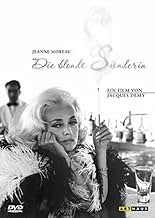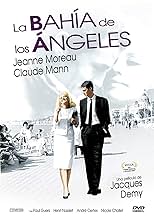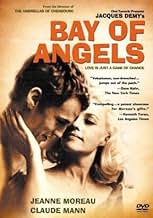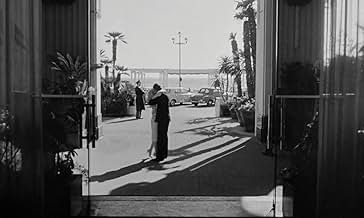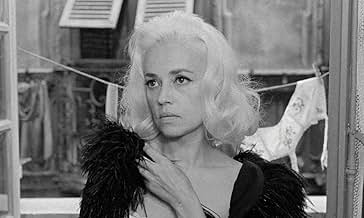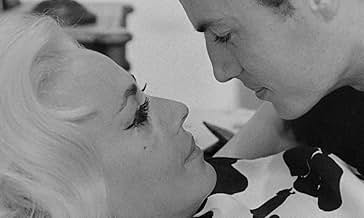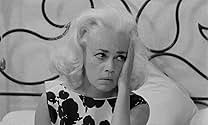IMDb रेटिंग
7.2/10
4.6 हज़ार
आपकी रेटिंग
अपनी भाषा में प्लॉट जोड़ेंJean is a clerk in a bank. His colleague Caron is a gambler and gives him the virus. In the casinos, Jean meets Jackie. Their love affair will follow their luck at the roulette.Jean is a clerk in a bank. His colleague Caron is a gambler and gives him the virus. In the casinos, Jean meets Jackie. Their love affair will follow their luck at the roulette.Jean is a clerk in a bank. His colleague Caron is a gambler and gives him the virus. In the casinos, Jean meets Jackie. Their love affair will follow their luck at the roulette.
- पुरस्कार
- कुल 1 जीत
फ़ीचर्ड समीक्षाएं
This is a kind of interesting film. It has been overshadowed by later, greater works by Jacques Demy, such as Les Parapluies de Cherbourg, but at its heart it has pretty much the same themes - the difficulties of translating American modernity into French provincial life. Moreau has an unusual turn as an Americanised film star, complete with bleached blonde hair -do a la Marilyn Monroe, playing Jackie, a gambler on the Cote d'Azur. Jean, on holiday from his strict father, falls in love with her. This slight plot (that really is it!)is the background for meditations on chance, love, luck, and life. There are some virtuoso cinematic moments, such as Jackie running toward Jean being glimpsed in mirrors at the end of the film. The overpowering score is slightly grating, but all in all it's a charming period piece.
Although it may not go down too well with Jacques Demy devotees who enjoy seeing his characters burst into song, I consider this to be his most accomplished work. Not only is it close to perfection and technically flawless, no other film has managed to capture so well the agony and ecstasy of gambling.
Jean is introduced by a friend to the roulette tables in Nice and gets the bug. Initially he exercises great self-contol and quits when he's ahead but all that changes when he meets an addictive gambler named Jacqueline. They become lovers and the high and lows they experience in the casino are reflected in their relationship. Here Jeanne Moreau, one of the greatest of French actresses, complete with dyed blonde hair, cigarette holder and outfits from Pierre Cardin, is utterly riveting as Jacqueline and is perfectly complemented by Claude Mann whose first film this is. Excellent script by Demy although by all accounts he had little experience of gambling. Camerawork, editing and production design are exemplary. Unsurprisingly the score is by Michel Legrand whose partnership with Demy is one of cinema's most rewarding.
The gambler's life with its cycles of euphoria and despair and its dramatic fluctuations of luck, is very often frowned upon. Demy does not stoop to moralising but simply presents gambling as a metaphor for living. What this tender, bittersweet and entertaining piece does is to remind us that in the world of the gambler one law reigns supreme:THE HOUSE ALWAYS WINS.
Jean is introduced by a friend to the roulette tables in Nice and gets the bug. Initially he exercises great self-contol and quits when he's ahead but all that changes when he meets an addictive gambler named Jacqueline. They become lovers and the high and lows they experience in the casino are reflected in their relationship. Here Jeanne Moreau, one of the greatest of French actresses, complete with dyed blonde hair, cigarette holder and outfits from Pierre Cardin, is utterly riveting as Jacqueline and is perfectly complemented by Claude Mann whose first film this is. Excellent script by Demy although by all accounts he had little experience of gambling. Camerawork, editing and production design are exemplary. Unsurprisingly the score is by Michel Legrand whose partnership with Demy is one of cinema's most rewarding.
The gambler's life with its cycles of euphoria and despair and its dramatic fluctuations of luck, is very often frowned upon. Demy does not stoop to moralising but simply presents gambling as a metaphor for living. What this tender, bittersweet and entertaining piece does is to remind us that in the world of the gambler one law reigns supreme:THE HOUSE ALWAYS WINS.
On the one hand, as someone who has never gambled once in her life, this is low-key fascinating as it offers a glimpse into a world unknown to me. On the other hand, ill-advised, habit-forming, and kind of filthy as the vice is, I feel unclean even watching, like I may as well be watching people live in perpetual clouds of cigarette smoke and brush their teeth with nicotine. And on still another hand, 'La baie des anges,' or 'Bay of angels,' initially comes off as so direct - protagonist Jean's whole outlook changes after the very first time that he plays roulette - that the picture almost recalls exploitation flicks like 1936's 'Reefer madness' or 1954's 'Girl gang'; you know, the type of feature that posits a single puff of marijuana leads immediately to hard drugs and violent crime. Of course, it may be just as true that this is simply a drama that happens to center gambling, though I don't think the alternate perspectives are ameliorated by the fact that Jeanne Moreau, only 35 years old at the time this was released, is made to look significantly older in 1963 than she did in features released just before or even a few years after this. In any case, the movie is fantastically well made all around, and solidly engaging.
I don't know what is more rich and flavorful about this: Jacques Demy's direction, Jean Rabier's cinematography, Anne-Marie Cotret's editing, or Michel Legrand's original music. There's a smart dexterity to each of these facets that comes off as lightheartedness as they shape the film, and I wonder if they aren't the chief highlights above even the storytelling. With that said, Demy penned an engrossing narrative as Jean gets completely sucked into the gambling lifestyle alongside hopeless addict Jackie. The scene writing and dialogue is superb, and rather entrancing as the tale progresses. Above all, the two chief characters are complicated and intriguing in their shared ordeal, and the real focal point of both the writing and the picture as a whole. Jean and Jackie's personalities, and they way they're lit on fire by gambling, are the primary fuel for the proceedings, and I could stand for 'La baie des anges' to be longer than it is just on their account. To that same point, Claude Mann and especially Moreau give excellent performances befitting the variable dynamics of that central relationship and all that the pair go through, and it's a real pleasure as a viewer just to watch them ply their trade.
I can't say that this is perfect, as the ending is a tad too curt for my tastes, not to mention overly neat and clean; the cinematic journey isn't as entirely satisfying as it could have been if the destination weren't so close to where we began. Even setting that aside, for as well made as this is, there's no singular stroke of brilliance at any point, and the feature is never so captivating (let alone impactful) as to demand viewership. Yet for however much one may him and haw about the particulars, by and large this remains an enjoyable, very worthwhile viewing experience. It's a fine credit to all involved, including those behind the scenes, and ultimately a classic that deserves remembrance and recognition. I don't think there's any need to go out of one's way for it, but whether one is a big fan of someone involved or just looking for a good movie, as far as I'm concerned 'La baie des anges' is well worth checking out.
I don't know what is more rich and flavorful about this: Jacques Demy's direction, Jean Rabier's cinematography, Anne-Marie Cotret's editing, or Michel Legrand's original music. There's a smart dexterity to each of these facets that comes off as lightheartedness as they shape the film, and I wonder if they aren't the chief highlights above even the storytelling. With that said, Demy penned an engrossing narrative as Jean gets completely sucked into the gambling lifestyle alongside hopeless addict Jackie. The scene writing and dialogue is superb, and rather entrancing as the tale progresses. Above all, the two chief characters are complicated and intriguing in their shared ordeal, and the real focal point of both the writing and the picture as a whole. Jean and Jackie's personalities, and they way they're lit on fire by gambling, are the primary fuel for the proceedings, and I could stand for 'La baie des anges' to be longer than it is just on their account. To that same point, Claude Mann and especially Moreau give excellent performances befitting the variable dynamics of that central relationship and all that the pair go through, and it's a real pleasure as a viewer just to watch them ply their trade.
I can't say that this is perfect, as the ending is a tad too curt for my tastes, not to mention overly neat and clean; the cinematic journey isn't as entirely satisfying as it could have been if the destination weren't so close to where we began. Even setting that aside, for as well made as this is, there's no singular stroke of brilliance at any point, and the feature is never so captivating (let alone impactful) as to demand viewership. Yet for however much one may him and haw about the particulars, by and large this remains an enjoyable, very worthwhile viewing experience. It's a fine credit to all involved, including those behind the scenes, and ultimately a classic that deserves remembrance and recognition. I don't think there's any need to go out of one's way for it, but whether one is a big fan of someone involved or just looking for a good movie, as far as I'm concerned 'La baie des anges' is well worth checking out.
First a note of interest: Jeanne Moreau is in the movie, and she's the star, of course, but she's also a blonde here. Usually, from what I can remember from say The Lovers or La Notte or Jules & Jim it's dark or at least brunette. I wonder if she was already blonde at the time or if it was a deliberate and specific choice on director Jacques Demy's end. Because, somehow, it does add something extra to the character. When we first see her on screen she's being 'escorted' (kind word for kicked out) of a casino that Jean and Caron are at to start gambling, and it's a big scene where we see her arguing and stomping her feet and we barely see her face, just a fury of big blonde hair and attitude to match. It's not exactly the same cool presence one saw in some of Moreau's other big films of the period - and yet when we see her again she is lovely and with that face that charms immediately upon the smile, and makes one feel the gloom of after hours when looking serious.
Bay of Angels is a movie that works best when Demy focuses his theme on escapism, what would appear to be at first a film for escapists, about people going off to rich places like Monte Carlo and gambling away the life savings and having a great time in expensive suits and drinking champagne. But it's also about the nature of this escapism, the danger of it. It's predictable to see that Jean, who comes from a family where gambling is incredibly frowned upon, and Jackie, who at one point confesses that going into a casino is like going into Church, will lose a lot of money, maybe all of it, and keep going in dire straits throughout. What isn't expected is how Demy interweaves this seemingly endless back and forth of the bottomless pit that is a gambler's life (if only seeming like a lifetime in however few days Jean/Jackie are together) and how touching it becomes against the backdrop of glamour. At the least, his film is about something.
The only problems come with a few scenes in the script that drag - the dialog often works, but sometimes not quite enough to satisfy the emotional purpose of a scene. Maybe also contributing to this is first time actor Claude Mann as Jean. Mann would later be featured in Melville's Army of Shadows, among other notable films, but here he just can't hold his own most of the time alongside such a presence like Moreau. It was wise to cast someone young, and maybe not with the most experience, as this kid who goes on vacation from a small bank-clerk job to try and find himself by way of throwing away hundreds of thousands (albeit I pictured more-so, as the film went on, the actor who played the lead in Pickpocket). But Mann just doesn't really fit in, especially when he has to go into big dramatic scenes (i.e. the outbursts of anger against Jackie in the hotel rooms).
And yet Bay of Angels displays a director with an intuition with the camera, a grace and style, and a dazzling sense of music, precisely repetitive, over the shots of the roulette table spinning around and the faces dissolving in and out with it. There are beautiful moments, and it's hard not to take eyes ever off of Moreau, one of those actresses who keeps working today into her late 70s going on 80s but whom one thinks of in black and white only. She had/has one of the great faces in movies, and she's a damn good actress to boot. 7.5/10
Bay of Angels is a movie that works best when Demy focuses his theme on escapism, what would appear to be at first a film for escapists, about people going off to rich places like Monte Carlo and gambling away the life savings and having a great time in expensive suits and drinking champagne. But it's also about the nature of this escapism, the danger of it. It's predictable to see that Jean, who comes from a family where gambling is incredibly frowned upon, and Jackie, who at one point confesses that going into a casino is like going into Church, will lose a lot of money, maybe all of it, and keep going in dire straits throughout. What isn't expected is how Demy interweaves this seemingly endless back and forth of the bottomless pit that is a gambler's life (if only seeming like a lifetime in however few days Jean/Jackie are together) and how touching it becomes against the backdrop of glamour. At the least, his film is about something.
The only problems come with a few scenes in the script that drag - the dialog often works, but sometimes not quite enough to satisfy the emotional purpose of a scene. Maybe also contributing to this is first time actor Claude Mann as Jean. Mann would later be featured in Melville's Army of Shadows, among other notable films, but here he just can't hold his own most of the time alongside such a presence like Moreau. It was wise to cast someone young, and maybe not with the most experience, as this kid who goes on vacation from a small bank-clerk job to try and find himself by way of throwing away hundreds of thousands (albeit I pictured more-so, as the film went on, the actor who played the lead in Pickpocket). But Mann just doesn't really fit in, especially when he has to go into big dramatic scenes (i.e. the outbursts of anger against Jackie in the hotel rooms).
And yet Bay of Angels displays a director with an intuition with the camera, a grace and style, and a dazzling sense of music, precisely repetitive, over the shots of the roulette table spinning around and the faces dissolving in and out with it. There are beautiful moments, and it's hard not to take eyes ever off of Moreau, one of those actresses who keeps working today into her late 70s going on 80s but whom one thinks of in black and white only. She had/has one of the great faces in movies, and she's a damn good actress to boot. 7.5/10
I was chilled to the bone, and mesmerized, by the dark crime of M (1931). Then, in the double-feature session, the 15-y-o boy trespassing as a 17-y-o, quickly changed his temperature when the 'great sinner' Jeanne Moreau appeared on La Baie des Anges (1963). «Actress Moreau forcefully demonstrates the verve, style and flamboyant femaless that make her the envy of European sex symbols much greener in years and cooler in blood. Her wicked, winning presence has saved a bad movie from utter oblivion, and at 36 she knows how to turn Bay of the Angels into a one woman show.» So wrote a reviewer (Time, November 27, 1964), and I couldn't put it better; I'm now copying this from my typewritten notes - no photocopier at home, then. That young boy would never enter a casino in his life due to this film, and he tried to see all the films starring Jeanne Moreau. I'm a winner on two counts, by money not given away to casino owners, and by a plethora of good films that were saved from oblivion by this great woman, and actress.
क्या आपको पता है
- ट्रिवियाAccording to Agnès Varda, Jacques Demy had little to no experience gambling prior to making this film. Although another source states Demy decided to make the movie after winning a large bet placed on the number 17. Jackie's lucky number is also 17.
- भाव
[English subtitled version]
Jean Fournier: I've been the studious, mild-mannered boy up until now. That's over now. I need something else.
- कनेक्शनFeatured in Jacquot de Nantes (1991)
टॉप पसंद
रेटिंग देने के लिए साइन-इन करें और वैयक्तिकृत सुझावों के लिए वॉचलिस्ट करें
- How long is Bay of Angels?Alexa द्वारा संचालित
विवरण
बॉक्स ऑफ़िस
- US और कनाडा में सकल
- $85,840
- दुनिया भर में सकल
- $85,840
- चलने की अवधि1 घंटा 30 मिनट
- रंग
- ध्वनि मिश्रण
इस पेज में योगदान दें
किसी बदलाव का सुझाव दें या अनुपलब्ध कॉन्टेंट जोड़ें


